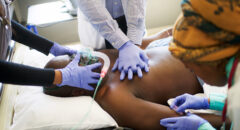
Award-winning actress, singer, songwriter, television producer and talk show host Queen Latifah looks mean in green in NBC's adaptation of The Wiz Live! (she's "The Wiz"), but offscreen Latifah goes red for her mother and the millions of people diagnosed with heart failure (HF). Queen Latifah and her mother Rita Owens, who suffers from heart failure, have joined the American Heart Association's Rise Above Heart Failure campaign to let everyone know that with education, support and by being proactive with managing the condition, people can live with HF.
"My mom is stronger than anyone I've ever known. Growing up, when life got hard her strength helped pull us through," the actress said in a recent PSA for the American Heart Association. In 2013, Owens was diagnosed with scleroderma, an incurable autoimmune disease that caused scar tissue to build up in her lungs, requiring her to be on oxygen 24/7.
MUST READ: All Hail The Queen...Of Healthy Living
Owens later was diagnosed with heart failure after passing out while teaching art at a New Jersey high school. The diagnosis changed Latifah and her mother's relationship for the better Latifah told PEOPLE in an interview. "We've learned a new us. We've gotten a lot closer and we've learned each other on a whole different, deeper level."
"I found myself becoming a recluse," Owens said in the same interview about life after her HF diagnosis. "You have to understand your body is not processing the same way it was before. I started counting the things I can't do instead of the things I can do. And I said, 'Nope, this is not acceptable.' "
With the help of Latifah's uplifting spirit, affirmations and attending church, "I started coming back," Owens says. "I thank the Lord every day that I have that I can live with this, and that He put people in my life that told me so."
Together, they are helping others living with HF find their way back.
HF, also known as congestive heart failure, is a chronic, progressive condition in which the heart is unable to pump enough blood to meet the body’s needs. It affects 1 in 5 people and African Americans have the highest risk of developing heart failure, and the risk of developing the condition before age 50 is also greater in African Americans.
Many tend to believe heart failure is a condition that primarily affects men, but that is not the case. "Heart failure is an equal opportunity disease and as many women are likely to have this diease as men. And because it's a disease of aging and women tend to live longer, in later years this is a disease that uniquely impacts women," explains Clyde W. Yancy, M.D., a past president of the American Heart Association and Chief of Cardiology and Magerstadt Professor at Northwestern University Feinberg School of Medicine in Chicago, in a recent interview with BlackDoctor.org. "What [Queen Latifah] has done for us has been to put a name and a face on this condition."
Heart Failure vs. Heart Disease vs. Heart Attack
Heart failure, heart disease and heart attack are often mistakenly used interchangeably, but the are each different. As Dr. Yancy explains, "Heart failure is a type of heart disease. Many people get heart failure confused with heart attacks. They're not the same. A heart attack can lead to heart failure, but a heart attack is not necessarily the same thing as heart failure. And a heart failure episode can be caused by many, many things other than a heart attack."
Think of heart disease like an umbrella and there are any number of types of diseases, one of which is heart failure. Heart failure is one of the most common types of heart disease and unlike other forms of heart disease it is growing in significance.
How Do You Know When It's Heart Failure?
Since HF simply means that the heart is not functioning properly, the signs of HF is what happens when the heart fails to provide blood flow to the rest of the body. "With heart failure, the flow of blood through the body is no longer adequate, and so symptoms of fatigue, and listlessness and forgetfulness can occur. As well, with exercise, there's very poor ability to exercise. And so there's the almost immediate or early onset of fatigue with exercise," shares Dr. Yancy.
He adds that, "Now when fluid backs up because the pump [heart] isn't working well then we have symptoms related to congestion. That could be swelling of the legs and ankles, that could be cough, that could be fluid in the lungs, that could be this overall sense of weight gain, this overall sense of heaviness. So there are some symptoms that are pretty vague in the beginning. Just simply being tired, or feeling bloated or feeling full. But then there's more specific symptoms, like not being able to breathe, not being able to do meaningful exercise, having certain swelling of the ankles, the legs, the abdomen. That constellation of symptoms really makes us worried that a person is suffering from heart failure, and then we know that periodically what may happen is a series of irregular heartbeats. And so palpatations, even collapse, might be associated with heart failure."
Why Are Blacks At Higher Risk For HF?
African Americans are diagnosed with HF at an earlier age and when it is diagnosed it is usually with more severity. Dr. Yancy believes one explanation for this disparity is that African Americans seem to have a unique vulnerability to the effects of high blood pressure. "When you consider how common high blood pressure is in African Americans and then recognize that high blood pressure is a causative explanation for heart failure you can begin to see that if you look at a group of people that are likely to have high blood pressure and high blood pressure's likely to cause heart failure, then you begin to understand that those people might also have a high likelihood of having heart failure and that's what our research has demonstrated."
Although the statistics seem grim, Dr. Yancy finds hope in that outcomes of living with HF are much better than they ever were before. "No matter how good we are managing this condition, the real key consideration is prevention." Because there is a known link between high blood pressure and HF, Dr. Yancy is adamant they every Black person MUST know their blood pressure number - know it like their cell number - and keep it under control. "The risks are too great for you not to do that."









